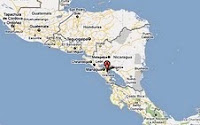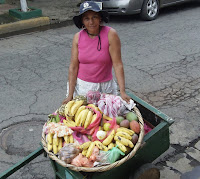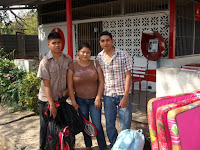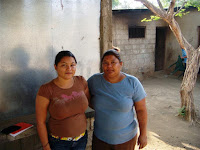Often I find myself thinking of ways to raise sponsorship funds for BECA locally, that is, in the Nicaraguan economy.
One method that I have seen used by non-profit organizations (NPOs) working here is the visiting "helping" brigades concept.
It works something like this. People in the "developing world" are willing to pay a premium to be a part of a volunteer group that travels for a short term period to work in poor communities in a country like Nicaragua. The NPO organizes the trips, administers the local do-good projects, and for their effort, pockets the profits. These profits are then funneled back into their own development activities.
 Bridges to Community
Bridges to Community is an example of an NPO that employs this concept successfully here in Nicaragua.
The visitors are willing to pay a pretty decent dollar to come here and "help." To plant trees. To build houses. To play with children. To teach English.(especially popular!).
(Aside: Always seemed a wee bit odd to me that foreigners are coming here to plant trees in a country where the employment and under-employment rate is exorbitant . . . but I'll save that thought for another blog.)
Okay, so we have these people coming to help. And, frankly, quite often they aren't experts in their field. Often they are college students. Another big constituency is church goers. In my experience, more often than not, their Spanish is rudimentary.
Why do they come? Yes, they come to help. But I submit to you that one of the main reasons they come is to see poverty with their own eyes, "up close and personal". Not that there is anything wrong with that. But let's call a spade a spade.
Back to my original premise. Some NPOs tap into this demand and generate revenue for their organizations.
*Gross oversimplification alert*: People come. People pay a top dollar. People drink in the poverty, plant some trees and leave feeling better about themselves.
And perhaps they leave with a better understanding of poverty. All of this seems like a pretty good thing and a win-win situation.
I thought it was something BECA could stick its toe into. After all we have Hotel and Tourism students in the BECA program. Some of them even speak a little English.
What could be the possible downside (other than some serious mission drift)?
Can't think of one? Try reading
this. (And in the spirit of fairness, see an opposing point of view
here)
So what do you think? Exploitative or helpful/educational?
And why do I hear my Dad saying . . . "Have you considered the matter from the other point of view?"
Gulp.







































